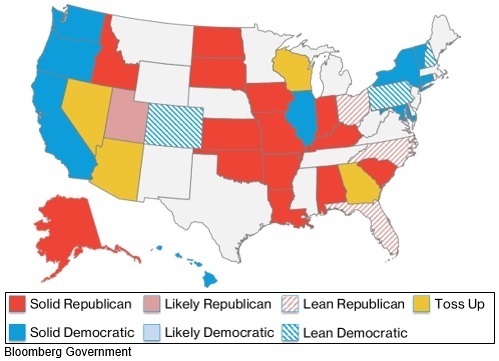Articles + Publications November 1, 2022
2022 Midterm Election
Republicans are trying to win back control of Congress in November. Democrats narrowly control the House (220-212) and Senate (50-50) but are facing strong headwinds. Coupled with President Biden’s relatively low approval rating (42.3%), Republicans are widely expected to win the majority in the House. The path to the Senate majority is less clear. Although Democrats have been slightly favored to retain control for the past few months, polling is trending more favorably to the GOP in the Senate.
Historical Perspective: The party controlling the White House usually loses seats during midterm elections. According to data compiled by the American Presidency Project at UC Santa Barbara, “in the 22 midterm elections from 1934 -2018, the president’s party averaged a loss of 28 House seats and four Senate seats. The president’s party gained seats in the House only three times but gained seats in the Senate on six occasions. The president’s party has gained seats in both houses only twice.”
Key Factors:
1. Voter turnout tends to be lower in midterm election years than in presidential election years. Traditional thinking says lower voter turnout favors Republicans.
2. The record voter turnout we saw in the 2020 presidential election may carry over into a higher-than-average turnout for the 2022 midterm. More than 122 million people voted in 2018 midterm elections, and more than 159 million people voted in the 2020 presidential election.
3. The Supreme Court’s Dobbs v. Jackson decision may boost Democratic turnout across the country. In the five House special elections held since the Dobbs decision, Democrats have outperformed the district’s baseline partisanship.
- For example, in the NY-19 and NY-23 special elections held on August 23, the partisan leans of the districts were R+4 and R+15, respectively. The election vote margins ended with D+2 and R+7, resulting in margin swings of D+6 and D+8, respectively.
4. Redistricting shifted the partisan lean of many districts. Districts that once heavily favored Republicans may now be more competitive or favor Democrats, and vice versa.
Democrats’ National Message: Democrats are focused on protecting reproductive rights, preventing a federal abortion ban, and are attacking Republicans for supporting the Supreme Court’s Dobbs decision. Democrats are also going after Republicans who denied the 2020 presidential election results or supported those who attacked the U.S. Capitol building on January 6, 2021. In the closing weeks before the election, Democrats have shifted from attacking Republicans to touting their economic and health care achievements, such as their efforts to lower prescription drugs through the Inflation Reduction Act. View abortion ads in the OH-1 and the VA-7 races and an election denying ad in the NV Senate race.
Republicans’ National Message: Republicans are hammering President Biden and congressional Democrats over wasteful government spending, historic levels of inflation, high energy and consumer prices, and a looming economic recession. Crime, immigration, and border security have also been significant talking points in political ads across the country. View an ad on crime in the OH-1 race, ads on inflation in the WI Senate and VA-2 races, and an immigration ad in the FL Senate race.
House
Overview: Republicans need only a net gain of five seats to reach the required 218 seats for the majority. Republicans are widely expected to gain anywhere between 10 to 25 seats. Currently, Democrats have 220 seats in the House, and Republicans have 212. There are also three vacant seats — one previously held by a Republican and two held by Democrats. Additionally, a total of 66 current members are either retiring or seeking other offices, leaving seats open without an incumbent candidate.
Historical Perspective: The last time a president’s party gained seats in the House from the midterm elections was in 2002 when Republicans gained a net of eight seats in the wake of the September 11 attacks. Prior to that, Democrats gained five seats in 1998 under President Clinton.
How Democrats Can Maintain Control: House Democrats need to sustain — and improve on — their better-than-expected results in special elections in Alaska, Minnesota, Nebraska, and New York since the Dobbs decision. Democrats can accomplish this by keeping enthusiasm high, pushing early voting, and driving voter turnout. Although it’s unlikely that Democrats maintain control of the House, they may be able to mitigate losses.
How Republicans Can Win: Earlier this year, many pundits predicted a red wave this midterm. Although this expectation has ebbed and flowed, Republicans are still widely expected to win control of the House, barring any late surprises. Republican candidates need strong performances in districts where Democrats flipped seats away in 2018 and 2020 running against then-President Trump. States where Republicans hope to make new gains are Maine, Michigan, New York, Nevada, Pennsylvania, Rhode Island, and Virginia.
Key Races to Watch: According to the House race ratings by the Cook Political Report as of October 25, Democrats control 23 of the seats rated as toss-ups compared to just 10 held by Republicans. As the chart below indicates, several seats currently held by Democrats are rated lean or likely Republican, compared to just two Republican-held seats in the lean Democrat category. This is a challenging political landscape for Democrats to defend.

The Cook Political Report: https://www.cookpolitical.com/ratings/house-race-ratings
Senate
Overview: Republicans need a net gain of only one seat to win control of the Senate. If the Senate remains 50-50, as it currently stands, Vice President Harris will give Democrats the majority by casting a tie-breaking vote. Thirty-five of the 100 Senate seats are up for election in November, with Republicans currently holding 21 of those seats compared to 14 for Democrats. Additionally, six sitting Republican senators are retiring compared to only one Democrat.
Historical Perspective: The last time a president’s party gained seats in the Senate from the midterm election was in 2018 when Republicans were in the majority and gained two seats, mostly due to Democrats controlling most of the seats (26 of the 33) that were up for reelection. Prior to that, Republicans gained two Senate seats in 2002 under President Bush.
How Democrats Can Maintain Control: Democrats must protect incumbents in Arizona, Georgia, and Nevada, while also looking to pick up an extra seat in Ohio, Pennsylvania, or North Carolina. Flipping one Republican-held seat can either pad their majority or protect the majority if a Democratic incumbent loses.
How Republicans Can Win: Republicans are targeting the Arizona and Georgia seats — two seats flipped by Democrats in 2020 in traditionally Republican-leaning states — as two of their best options for winning the majority. Nevada could also be a key pickup, while maintaining their seat in Pennsylvania is crucial.
Key Races to Watch: Control of the Senate will be determined by the winners of these races (incumbents are italicized).
Arizona – Senator Mark Kelly (D) Blake Masters (R)
- Incumbent Senator Mark Kelly defeated Martha McSally (R) in the 2020 special election that helped give Democrats their current majority. Masters, a venture capitalist and author, has consistently trailed Kelly in polling and raised significantly less money than Kelly in the third quarter. Masters is also backed by former President Trump.
Georgia – Senator Raphael Warnock (D) Herschel Walker (R)
- Georgia was the closest state in the 2020 presidential elections, with Biden at 49.5% to Trump’s 49.3%. Warnock won in 2020 and is currently serving out the remainder of the late Senator Johnny Isakson’s seat (2016-2022).
- From late July through early September, polls had Warnock and Walker running neck and neck. Recent revelations that Walker paid for abortions for former girlfriends have helped Warnock pull ahead in the race, but Walker has clawed his way back to even.
- Walker remains popular with the Trump voter base, a group expected to have a higher turnout than in 2020. Walker may also benefit from being on the ticket with popular Governor Brian Kemp (R) who leads in the polls against his opponent Stacey Abrams (D).
- There is a high probability that neither Walker nor Warnock will garner 50% of the vote on November 8 required to win the election under Georgia law. If that’s the case, there will be a runoff election on December 6. Therefore, control of the Senate may not be known right after election day.
Nevada – Senator Catherine Cortez Masto (D) Adam Laxalt (R)
- Nevada is the most likely pickup for the GOP in 2022. Laxalt, a former attorney general, is just ahead of Masto in recent polling, and closed the gap significantly over the last few months. Masto is the first Latina ever elected to the Senate and is in her first term. Biden won Nevada in the 2020 election by 2.4%.
North Carolina – Rep. Ted Budd (R) vs. Cheri Beasley (D)
- Richard Burr (R) is retiring, leaving this seat open. Former Chief Justice Beasley would be the first Black woman to represent North Carolina in the Senate if she wins. Budd has been a member of Congress since 2016 and has consistently held a lead in the polls, despite an advantage in fundraising for Beasley.
Ohio – Rep. Tim Ryan (D) vs. JD Vance (R)
- Retiring Rob Portman (R) has left a seat open in a state won by Trump in the 2020 election by more than 8%. Despite running a good campaign and closing the polling gap compared to earlier this year, Ryan’s chances of winning the seat remain slim. Ohio has trended more Republican over the past few elections. Vance, an author and venture capitalist, won a crowded GOP primary with the help of Trump’s endorsement.
Pennsylvania – LT Governor John Fetterman (D) vs. Dr. Mehmet Oz (R)
- In a seat being vacated by retiring Pat Toomey (R), Fetterman and Oz are running a close race in a state won by President Biden in 2020 by just 1.2% of the vote. Fetterman has attacked Oz for his endorsement by former President Trump and his ties to New Jersey. Oz has questioned Fetterman’s ability to serve due to a stroke he suffered in May.
- The race tightened recently after an NBC interview aired, showing Fetterman using closed captions to help him understand what was being said that raised more questions about his health. Fetterman also used closed captions during the most recent debate with Oz, and often struggled to articulate his positions clearly.
Wisconsin – Senator Ron Johnson (R) LT Governor Mandela Barnes (D)
- In mid-September, the race between Johnson and Barnes was a statistical tie according to polling. However, Johnson has pulled ahead in recent weeks in a state won by President Biden by less than 1% in 2020. Johnson has more money on hand than Barnes, which he has used to steadily release political ads to attack Barnes on several issues, especially on crime and defunding the police. Barnes, on the other hand, only released his first ad directly attacking Johnson on October 4.

Insight Industries + Practices







